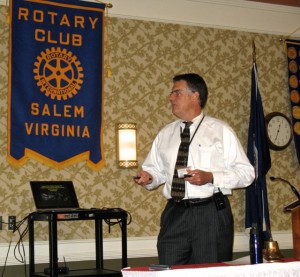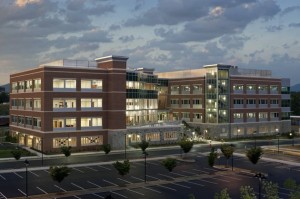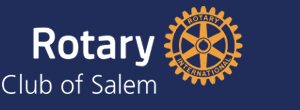Club Meeting – July 24th, 2014
 Today we were favored with a distinguished speaker, Michael Friedlander, PhD. Dr. Friedlander is Founding Executive Director, Virginia Tech Carilion Research Institute (VTCRI); Associate Provost for Health Sciences, Virginia Tech; Senior Dean for Research, Virginia Tech Carilion School of Medicine; and holds various research, teaching and administrative positions nationally.
Today we were favored with a distinguished speaker, Michael Friedlander, PhD. Dr. Friedlander is Founding Executive Director, Virginia Tech Carilion Research Institute (VTCRI); Associate Provost for Health Sciences, Virginia Tech; Senior Dean for Research, Virginia Tech Carilion School of Medicine; and holds various research, teaching and administrative positions nationally.
Dr. Friedlander was very personable. The presentation revealed his wit and a complete command of the subject matter. He shared with the Club a quick history of the VTC institutes, what has been accomplished and what the future might hold for the Virginia Tech Carilion School of Medicine and Research Institute.
Space limitations do not afford room to recap all the points Dr. Friedlander touched upon during his speech. The selected highlights below are suited for laypeople, so an in-depth explanation of the good doctor’s primary area of research – synaptic plasticity – will not be forthcoming, but you may enlighten yourself here.
The first four years have proven to be “something exciting for the entire region” and gratifying to the VTRCI in that it has fulfilled its Mission Statement. From the outset, the founders have had the luxury and the burden of “starting from scratch.” The guiding question has consistently been: “Where can we really make a difference?”. To paraphrase Dr. Friedlander, “How could they position themselves to become real good at a few things.” As Dr. Friedlander observed, an on-going challenge has been “how to recruit good people and retain them.” Nonetheless, to date the VTCRI has succeeded in attracting top researchers from across the nation and the world. The areas of research focus on:
- neuroscience
- cardiovascular
- cancer / virology / immunology
 Being able to map their own way allowed the VTCRI to structure themselves in a manner different than most traditional academic institutes or corporate research departments. The leadership decided to “organize around principles of questions and challenges.” Individuals with differing areas of expertise work in teams to solve problems. The VTCRI currently has 24 faculty research teams leaders and a total of 175 employees with a payroll over $10,000,000.
Being able to map their own way allowed the VTCRI to structure themselves in a manner different than most traditional academic institutes or corporate research departments. The leadership decided to “organize around principles of questions and challenges.” Individuals with differing areas of expertise work in teams to solve problems. The VTCRI currently has 24 faculty research teams leaders and a total of 175 employees with a payroll over $10,000,000.
Dr. Friedlander stated “we live and die by grants”, for which the VTCRI competes in a very tough environment both nationally and internationally . Over the first four years the amount of monies needed from Carilion and VT, as a percentage of the total budget, has diminished due to the funding generated by grant activity. The VTCRI’s 30% success rate compares to a national average of 6-7%, which reflects favorably on the decisions made by those guiding the institute. The resulting economic impact to our region has been close to a quarter of a billion dollars. In our recap, we would be remiss in not including a favorite economic data point of Dr. Friedlander – in the last four years 42 VTC babies have been born in the Roanoke Valley.
Brain-related illness and disease, more so than any other healthcare issue, have the greatest negative impact (estimated at $1 trillion) on our national economy. Neuroscience research is a critical component needed to develop viable treatment. Yet, unfortunately, investment into understanding the root causes of mental illness and brain diseases are not given appropriate attention. The research being done at the VTCRI gives one hope that viable treatments and cures to a myriad of brain illnesses are not too far on the horizon.
Please visit the VTC Research Institute website to learn more about where they are finding ways to make a difference. The Rotary Club of Salem appreciates the people and their medical research which are bringing national and international recognition to our region. For personal and humanitarian reasons we wish them continued success.

